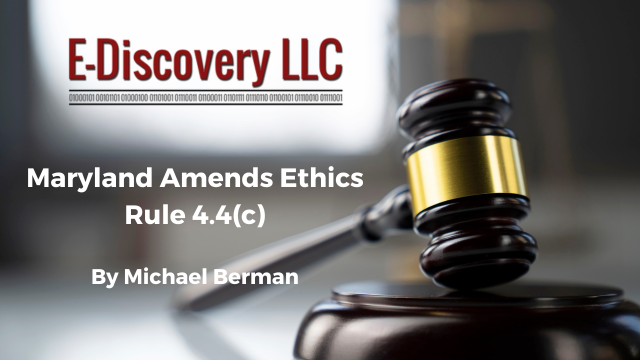
[EDRM Editor’s Note: The opinions and positions are those of Michael Berman.]
The Supreme Court of Maryland has amended Maryland Attorneys’ Rule of Professional Conduct 19-304.4(c) (Rule 4.4(c)).
Maryland’s new rule prohibits an attorney from seeking privileged information from a third person. If such information is disclosed to the attorney, the amended rule imposes a duty to terminate the conversation and provide notice to the person entitled to enforce the privilege. There is no analog in ABA Model Rule of Professional Conduct. 4.4.
Michael Berman.
Maryland’s new rule prohibits an attorney from seeking privileged information from a third person. If such information is disclosed to the attorney, the amended rule imposes a duty to terminate the conversation and provide notice to the person entitled to enforce the privilege. There is no analog in ABA Model Rule of Professional Conduct. 4.4.
ABA Model Rule of Professional Conduct 4.4 states only:
(a) In representing a client, a lawyer shall not use means that have no substantial purpose other than to embarrass, delay, or burden a third person, or use methods of obtaining evidence that violate the legal rights of such a person.
(b) A lawyer who receives a document or electronically stored information relating to the representation of the lawyer’s client and knows or reasonably should know that the document or electronically stored information was inadvertently sent shall promptly notify the sender.
ABA Model Rule of Professional Conduct 4.4.
Maryland’s Subsections (a) and (b) to Rule 4.4 are substantially similar.[1]
The prefatory language to Maryland’s new Subsection (c) states that the Rules Order amends “Rule 19-304.4 by adding new section (c) concerning information from third parties, by adding a cross reference following section (c), and by adding new Comment [4]….”
New Subsection (c) adds:
(c) In communicating with third persons, an attorney representing a client in a matter shall not seek information relating to the matter that the attorney knows or reasonably should know is protected from disclosure by statute or by an established evidentiary privilege, unless the protection has been waived. An attorney who receives information that is protected from disclosure shall (1) terminate the communication immediately and (2) give notice of the disclosure to the person entitled to enforce the protection against disclosure. If the person entitled to enforce the protection against disclosure is represented by an attorney, the notice required by this Rule shall be given to the person’s attorney.
The Committee Note states:
[4] Third persons may possess information that is confidential to another person under an evidentiary privilege or under a law providing specific confidentiality protection, such as trademark, copyright, or patent law. For example, present or former organizational employees or agents may have information that is protected as a privileged attorney-client communication or as work product. An attorney may not knowingly seek to obtain confidential information from a person who the attorney knows or reasonably should know has no authority to waive the privilege. Regarding current employees of a represented organization, see also Rule 19-304.2 (4.2).
Model Rules Comparison – Sections (a) and (b) of Rule 19-304.4 are substantially similar to the language of Model Rule 4.4 of the Ethics 2000 amendments to the ABA Model Rules of Professional Conduct….
The last sentence to that Note is new: “Section (c) substantially restores to the Rule Maryland language as it existed prior to a 2017 amendment, with slight modification.”
The Cross reference states:
Cross reference: To compare generally the duties of a party who receives inadvertently sent materials during discovery in a civil action in a circuit court, see Rule 2-402. See also Rules 2-510 and 2-510.1 to compare the duties of a party who receives inadvertently sent materials in answer to a subpoena. See Rules 1-331 and 19-304.2 (4.2) concerning communications with a person represented by an attorney.
The Rules Order is posted at *ro219.pdf (mdcourts.gov)
[1] Maryland’s current Rule 4.4(b) differs only stylistically: “An attorney who receives a document, electronically stored information, or other property relating to the representation of the attorney’s client and knows or reasonably should know that the document, electronically stored information, or other property was inadvertently sent shall promptly notify the sender.”


